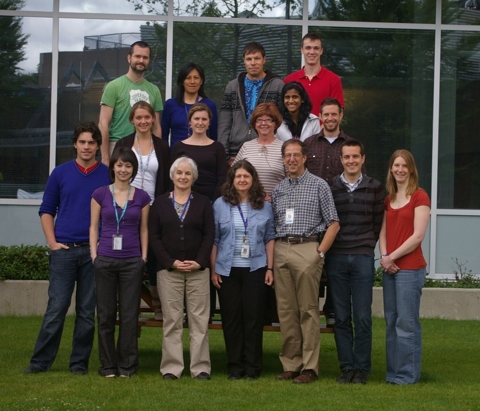|
|
Rebecca Malott

PhD - Post Doctoral Fellow, Dr. David Speert's Laboratory
Dr. Malott is a microbial pathogenesist who joined the Speert laboratory in September 2010 for her senior postdoctoral fellowship. Her research focuses on small bacterial metabolites; the regulation of metabolite biosynthesis by obligate and opportunistic bacterial pathogens and how these metabolites modulate the human immune system during health and disease.
Current Research Projects:
I. Characterization of a Neisseria gonorrhoeae-derived metabolite that drives HIV-1 expression in co-infected CD4+ T lymphocytes.
Clinical and epidemiological evidence suggests that common co-infecting sexually transmitted infections, including gonorrhoea, are associated with an increased risk of HIV-1 transmission and seroconversion upon exposure to the virus. This project aims to understand how Neisseria gonorrhoeae, the causative agent of gonorrhoea, mediates these effects at the molecular level. The central hypothesis is that a soluble N. gonorrhoeae-derrived metabolite induces expression of HIV-1 in its primary target cell, CD4+ T lymphocytes. Identification of the Neisseria-specific inducing factor and further understanding of its immune effects will provide a new paradigm for the interaction between N. gonorrhoeae and the HIV-1 infected host.
II. Evaluation of the pathogenic potential of early versus late clinical Burkholderia multivorans isolates.
B. multivorans is part of the B. cepacia complex, a group of opportunistic bacterial pathogens of great importance in individuals with cystic fibrosis (CF). Infection with these bacteria can cause a wide range of clinical outcomes in CF patients, ranging from mild disease to rapidly progressive septicemic death. The reasons for heterogeneous disease progression among these patients remain unclear. This project aims to study the effect of metabolites produced by bacteria isolated at different stages of infection on pulmonary epithelial tissue. Determining differential production of immunomodulatory bacterial metabolites would lead to a further understanding of pulmonary virulence in this elusive complex of organisms.
|
|
|

Laboratory Members
Visiting Students
- Brad Locke - Medical student
- Lourdes (Cynthia) Gunaratnam- Directed Studies student
- Connor Forbes - CFRI student
- George Hall - Volunteer
|
|
|
|
|
Selected Publications
1. Malott, R.J., B.R. Steen-Kinard, T.D. Lee, D.P. Speert. 2011. Identification of hopanoid biosysnthesis genes involved in polymyxin resistance in Burkholderia multivorans. Antimicrob Agents Chemother. 56: 464-471.
2. Dobson-Belaire, W.N., A. Rebbapragada, R.J. Malott, F. Y. Yue, C. Kovacs, R. Kaul, M.A. Ostrowski, and S. D. Gray-Owen. 2010. Neisseria gonorrhoeae effectively blocks HIV-1 replication by eliciting a potent TLR9-dependent interferon α response from plasmacytoid dendritic cells. Cellular Microbiol. 12: 1703-1717.
3. Taylor, R.R., H.C. Twin, W.W. Wen, R.J. Malott, A.J. Lough, S.D. Gray-Owen, R.A. Batey. 2010. Substituted 2,5-diazobicyclo[4.1.0]heptanes and their application as a general piperazine surrogate: synthesis and biological activity of a Ciprofloxacin analogue. Tetrahedron. 66:3370-3377.
4. O'Grady, E.P., D.F. Viteri, R.J. Malott and P.A. Sokol. 2009. Reciprocal regulation by the CepIR and CciIR quorum sensing systems in Burkholderia cenocepacia. BMC Genomics. 10:441.
5. Malott, R.J. and E.P. O'Grady, J. Toller, S. Inhulsen, L. Eberl and P.A. Sokol. 2009. A Burkholderia cenocepacia orphan LuxR homolog is involved in quorum sensing regulation. J. Bacteriol. 191: 2447-2460.
6. Sokol P.A., R.J. Malott, K. Riedel and L. Eberl. 2007. Communication systems in the genus Burkholderia: global regulators and targets for novel antipathogenic drugs. Future Microbiol. 2: 555-563.
7. Malott, R.J., and P. A. Sokol. 2007. Expression of the bviIR and cepIR quorum-sensing systems of Burkholderia vietnamiensis. J. Bacteriol. 189: 3006-3016.
8. Tomlin, K.L., R.J. Malott, G. Ramage, D.G. Storey, P.A. Sokol and H. Ceri. 2005. Quorum sensing mutations affect attachment and stability of Burkholderia cenocepacia biofilms. Appl Environ Micro. Appl Environ Microbiol 71:5208-5218.
9. Malott, R. J., A. Baldwin, E. Mahenthiralingam, and P. A. Sokol. 2005. Characterization of the cciIR quorum-sensing system in Burkholderia cenocepacia. Infect Immun. 73:4982-4992.
10. Malott, R. J., and P.A. Sokol. 2003. Cell-cell signaling mechanisms of the Burkholderia cepacia complex, p. 277-293. In S. G. Pandalai (ed.), Recent Research Developments in Infection and Immunity, vol. 1. Transworld Research Network, Trivandrum, India.
11. Malott, R. J., and R. Y. Lo. 2002. Studies on the production of quorum-sensing signal molecules in Mannheimia haemolytica A1 and other Pasteurellaceae species. FEMS Microbiol. Lett. 206:25-30.
| |

